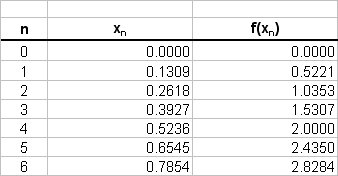How do you use Riemann sums to evaluate the area under the curve of # f(x) = 4 sin x# on the closed interval [0, 3pi/2], with n=6 rectangles using right endpoints?
2 Answers
Use your calculator.
Explanation:
# R RS = 1.355 #
Explanation:
We have:
# f(x) = 4sinx #
We want to calculate over the interval
# Deltax = ((3pi)/2-0)/6 = (3pi)/12#
Note that we have a fixed interval (strictly speaking a Riemann sum can have a varying sized partition width). The values of the function are tabulated as follows;
Right Riemann Sum
# R RS = sum_(r=1)^4 f(x_i)Deltax_i #
# " " = 0.1309 * (0.5221 + 1.0353 + 1.5307 + 2 + 2.435 + 2.8284)#
# " " = 0.1309 * (10.3516)#
# " " = 1.355 #
Actual Value
For comparison of accuracy:
# Area = int_0^((3pi)/12) \ 4sinx \ dx #
# " " = [-4cosx]_0^((3pi)/12) #
# " " = -4[cosx]_0^((3pi)/12) #
# " " = -4(cos ((3pi)/12)-cos0) #
# " " = -4(sqrt(2)/2-1)#
# " " = 1.1715#



